Tulsa is a strange place for a coup.
Scott Berens and his ragtag band of Doublewide teammates, Hodag friends, and Berkeley grads had traveled to the Sooner state for a chance to relax and drink a few beers at a small tournament in the middle of nowhere while escaping the early grind of the club season. Unbeknownst to his non-Texan teammates, Berens and his group of Young Turks had drafted and emailed founding Doublewide captain Keith “Homie” Sandel the day before with the news: we want change, and we want it now.
In early 2003, Doublewide was approaching its third season, and a group of young teammates were hanging out and venting their frustrations with the first two years. The team made nationals in 2001 and finished 16th in a classic happy-to-be-there performance. The second year, the team missed nationals by finishing third at regionals. Berens and company were less than pleased. “We didn’t feel as young players that we were being respected,” he says. “We didn’t feel like the older guys got it. You have to use the athletes more and go out and recruit them. You had to cater your team towards being younger, faster, stronger, and better. It morphed into this us vs. them – them being an old boys fraternity that didn’t want to do the work. On the surface, you wouldn’t have looked at the situation and figured this out. But we wanted control.”
The Bible describes six cities in the ancient Kingdoms of Israel and Judah in which perpetrators of manslaughter could claim the right of asylum while awaiting judgment. While Berens was having a carefree weekend in Tulsa, teammate Matt “Skip” Sewell was left to be sacrificed to the blood vengeance of Doublewide’s founding core. Sewell took the captains to Austin Java – a local coffee shop – on the day before team tryouts, and laid the manifesto on them.
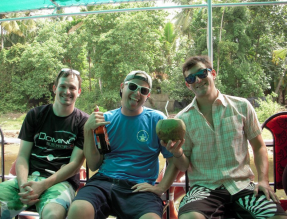
Scott Berens (right) with long-time teammates Daniel Poindexter and Matthew Stephens celebrating teammate Kiran Thomas’ wedding on a river boat cruise in Kerala, India (July 2012). Berens alleges to have concocted a new drink called the Bombay Blaster and/or Bombay Bomber.
Needless to say, it went poorly. Responses ranged from “Why today?” to “Why haven’t you approached us this entire offseason?” to “Why are you so dramatically making a mountain out of a molehill?” Players cried, the captains were livid, and Doublewide had a successful shit-storm on its hands smack dab in the middle of what should have been the most optimistic day of the season. The rest of the “Savage Seven,” as Berens calls them, returned from Oklahoma to receive an epic browbeating on Sandel’s futon. Even more absurdly, the captains had already discussed altering Doublewide’s strategy over the offseason to move closer to what Berens and company were suggesting. “If the communication was better, it would have been a complete non-event,” Berens says.
The Savage Seven incident inadvertently brought the team together, for better or worse, by putting everyone’s cards on the table. The team agreed to expand the distribution of leadership from two to three captains. Berens created the Supreme Advisory Council (SAC) for practice planning, recruitment, sponsorship, training, travel, and other functional duties. The SAC became a breeding ground for future captains and leaders of the team.
The schism took an entire season to mend and bitterness lingered long after. Berens and company learned how not to communicate, but the incident created a platform for open communication between players and captains. Surprisingly, no one quit the team. The exiled had returned from asylum.
———————————————————————————
Berens recently returned from a busy weekend of ultimate games, filming, conferences, and clinics with RISE UP at Amsterdam’s Windmill Windup, where he joined a Ben Wiggins-led American squad that provided the tournament with the most competitive and entertaining finals game in its history. For most ultimate players, this amount of activity would be exhausting. But for Berens, the Windmill Windup was a well-deserved return to his roots and a retirement victory lap of sorts after a triumphant 2012 club series with Doublewide.
His high school in northwest Houston didn’t have a team save for boy scouts and ad hoc church groups in the local neighborhood. He and some friends started a group called the Ultimate Frisbee Organization (UFO), throwing goals into a soccer net on a field illuminated at night by the harsh glow of the 24-hour grocery store parking lot next door. Seduced by a hellacious chest-high layout from Sewell during a frisbee clinic in the spring semester of his freshman year at the University of Texas (TUFF) in 1999, Berens instantly knew that he would switch his allegiance from tennis to ultimate.
During that time at TUFF there were no tryouts, just a couple of graduate students and young players. Berens was shocked that team leaders invited him to the Mardi Gras tournament in Baton Rouge, not realizing that the team barely had enough players to field a starting seven. Progress continued through the 2000-2001 year, but the team really exploded when Sewell arranged a three-on-three tournament that pulled in a sizable intramural crowd, including athletes from the cut lists of other sports.
Berens met his other partner in crime, Mike Natenberg, during his sophomore year. They have been inseparable ever since. Natenberg was a “complete bozo,” says Berens in jest. “He couldn’t stay on his feet. We used to call him a newborn deer because literally he would make a cut and do the splits and fall over.” He came from a serious basketball background. They knew he had the athleticism but had some doubts about his coordination on the field. He slowly began to figure it out, and after about six months dominated all of the workouts at practice. What was the key to getting a firm commitment from the studious Natenberg? A guarantee that the other guys would permanently call him Tank. “We got Tank and he got the nickname and the rest is history.”
UPA Club Nationals was held in Texas several times throughout the 80s and 90s, but only once did a Texas-based squad make it to the semi-finals. There were scattered teams and rivalries, but it wasn’t until Doublewide came together in 2001 that the disparate college talent in Texas coalesced into one club team. It was Sandel’s force of personality – and respect engendered by success with TUFF and the Houston Houndz – that brought players together for an Austin-based team founded on a culture of respect, perfect attendance, and loyalty. Berens, Natenberg, and Chuck “Diesel” Tsen were recruited to join the new Doublewide squad as the top three players on TUFF. Sean McCall, a former Houston Houndz player, brought in Max Cook and Patrick Eberle from Texas A&M, and as the team gradually became more successful players from around Texas began to try out. The philosophy, however, was that to be considered for the team outside of Austin you had to “bring something special” that the team could not get locally, be that height, super-athleticism, astounding throws, or lights-out defense.
Doublewide’s offense was programmed to dump and swing “to the detriment of utilizing athletes on the field,” said Berens. Modeled after DoG’s hundred-throw patient offense, Doublewide sought to take what the defense was giving them, losing yards if necessary. “We weren’t good enough to do that,” he says. “Against better teams, we weren’t good enough to maintain that style of offense.” Better marks or windier fields would wreak havoc on the team’s grind-it-out points.
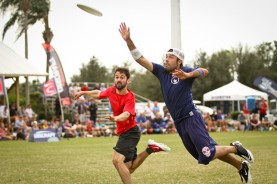
Max Cook stretches for a block at the 2012 Club Championships. (Photo by Christina Schmidt – UltiPhotos.com)
Despite the Savage Seven debacle, Doublewide finished 7th at Nationals in 2003, a significant step forward from the previous two years. After an 8th place finish in 2004, in 2005 Doublewide went from Savage Seven to Package Seven and recruited TUFF’s top seven players to play for the team. Prior to this time, TUFF players would often create their own team to play in the club series as a way of gaining chemistry during the college offseason. 2005 was the first year that solidified the connection between TUFF and Doublewide. As the TUFF program has grown, players stay in the area because they love Austin. Berens can also name over ten teachers in the area that came through the University of Texas men’s and women’s ultimate programs and coach ultimate at their respective schools.
After an early exit at the 2006 World Club Championships (WUCC) and missing UPA Club Nationals for a second time, Berens and Cook knew they needed to shake things up once more. They became captains in 2007 with McCall, creating a mix of old and new blood. Hitting the ground running, they ramped up track and weight workouts and creating a series of minicamps to simulate game-time experiences. “When I was a captain in 07 with Max and Sean, we really started to utilize our athletes downfield,” Berens says. While they finished 14th at Nationals that year and 11th in 2008, Berens felt like Doublewide was making incremental progress.
Doublewide had their solid foundation, but lacked elite talent to put them over the top. Help came in the form of Kurt Gibson, who accepted a job with IBM in Dallas in 2009. He was the perfect package of athleticism, throwing ability, poise, and leadership. Most importantly, he knew how to win after securing a college championship in 2006 with the University of Florida. Gibson was interested in playing for Doublewide, but he was in the midst of treatment for a devastating battle with colon cancer and wasn’t sure if he would have the will or ability to play again. It wasn’t until discussions between the Doublewide captains and 2006 University of Florida coach Kurt Dahlenberg, combined with a concerted outreach effort from Cook, that Gibson finally committed. Dahlenberg saw that Doublewide was a team on the cusp of greatness, and had the right mix of talent, leadership, and unity to compete for a national championship. Recruiting Gibson, Brodie Smith, and Tim Gehret became an essential part of his master plan for Doublewide. He became Doublewide’s coach for the 2010-2012 seasons and provided significant consulting for the suffocating “Florida” four-man cup. Gibson’s addition sparked the team to a fifth place finish in 2009 sent the team back to the world championships. The season cemented Doublewide’s reputation as a real contender. They had arrived on the big stage.
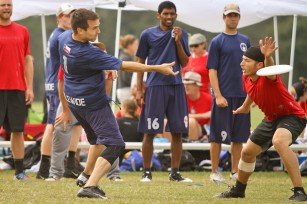
Florida and Seattle Sockeye veteran Tim Gehret played a major handling factor for Doublewide’s championship run. (Photo by Christina Schmidt – UltiPhotos.com)
Doublewide came close to club titles in 2010 and 2011 with semifinals appearances, but the Texas (quick disc movement) and Florida (isolation long-ball) philosophies clashed at the worst moments. In 2012, Natenberg implemented a new hybrid offensive strategy that combined a tight knit crew of long-tenured Austin players with Cole Sullivan and Brodie Smith’s freakish throws, while stacking the d-line with athletic studs. This strategy “gave us confidence and buy-in early on,” says Natenberg. “I remember Labor Day being a turning point for our offense, in the sense of confidence and trust in everyone’s ability to get it done. We lacked that trust in 2010 and 2011.”
While Doublewide had solved some of its strategic issues during the season, the plan began cracking at the seams at Nationals. The team was shellacked by Revolver in the power pools by a score of 15-3. “[That loss] was strictly a strategy mistake,” recalls Natenberg. “We gambled that the wind was strong enough to just punt and play D. We obviously got hammered and learned from it.” In quarterfinals, Doublewide eked out a narrow victory against GOAT in a game that seemed to be slipping away. “GOAT was our wake-up call that we needed to stay in the moment and not look ahead,” Natenberg says. “Thankfully we were able to complete the come back on some stellar defensive play from Kurt and Tim.” As a former captain, Berens was still in the habit of making sure that he knew everything that was happening with the team. He recalls Natenberg, normally a very mild-mannered guy, telling the team in no uncertain terms that Doublewide would utilize both philosophies, play unselfishly, and trust one other during the upcoming semifinals round.
It worked.
The game against Ironside was spectacular, if uneven, but Doublewide won the game by using all available skillsets and receiving full buy-in and trust from the sidelines. “When we faced Boston, we noticed at times they were trying the same strategy [of punt and play D] in the semis,” says Natenberg. “This personally gave me huge confidence that we were going to win that game. Boston hadn’t lost using that strategy yet and that was to our advantage. It was a simple adjustment, but just playing our ‘actual’ offensive structure going down wind was huge. Every once in a while we would throw a few more handlers on an upwind point to try and sneak and break.” By the time the team faced Revolver in the finals in a rematch, Doublewide had faced every possible adverse scenario, tried every strategy, and worked every angle. They were loose and confident. They finally trusted each other. They finally found a formula that worked.
When Rory Orloff scored the winning goal for Doublewide, Berens “had an out-of-body experience. I waited an eternity on the sidelines, watching all the players rush the field. It was all slo-mo, and took it all in. I knew that was going to be my last game, and was taking in the bigger moment of the team reaching the milestone that we had been plugging away on for 11 years. So I waited. Then I crashed the party. There were a group of us that were working out twice a week together and we had put 10/28/12 up on the wall in January when the workouts started. I put the date on a custom pair of cleats that I ordered online. We would constantly remind each other of the date to where it became part of our routine.”
Berens “knew it was gonna happen.” He knew that Doublewide had done the right things, that they had earned their spot in ultimate history. “It started in January [of 2012] and it started in 1999 when I saw Skip lay out for the first time,” he says. “That story starts to come together collectively because we won it, but it’s a process. It doesn’t happen overnight.”
He insists that he wouldn’t have come back even if Doublewide lost, and that the team is in good hands for 2013 and beyond with elite college talents like Alex Thorne and Tyler DiGirolamo. “Frisbee is a really tough sport, and you have to been ready and willing to commit everything you have to it,” Berens says. “I respect that. For me, it’s an all-in approach. I can’t be half-assing it. I’m 32. Sure I could play mixed or masters, but [I don’t believe that they are] less important than open. To play at the highest level in any sport requires a full time commitment. If you can’t repeat that then it’s not the same. Everyone is different. I’m sure Tank will still be playing in his sixties, and good for him. But for me, I want to do other things. My wife and I have been discussing this for years. Our bodies are feeling fine, but we are now at the point where we’re ready to move on. I love the sport so much, but it’s really an all-encompassing thing.”
Doublewide overcame season-long adversity and nail-biting finishes at Nationals to win the championship and validate 12 years of hard work. For Berens, it was the perfect capstone to an intensely rewarding career. No, 2012 wasn’t “his” team anymore. But through all of the struggle and turmoil, injuries, missed opportunities, and eventual triumph, he learned a few lessons: love and respect your teammates, cherish the time you have, and don’t hesitate to speak up for that which you believe.
Heck, even Berens and Sandel have made up. Berens now regularly plays mixed tennis doubles together with Sandel’s wife.
You couldn’t write a better ending.
Feature photo of Mike “Tank” Natenberg behind hoisted by his team after winning the championship. (Photo by Christina Schmidt – UltiPhotos.com)
About the title: According to Scotty Berens, the “Well Nasty Brotherhood” line has been around Doublewide since the early days but has never really been used in ‘public’. Originally invented by Sean McCall, Doublewide used to submit their UPA nationals writeups and include the line “We’re a well nasty brotherhood committed to … blah blah”.
“It definitely has meaning inside our huddle but I can’t really put into words what it should mean to the real world :),” explained Berens.
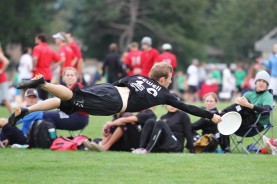
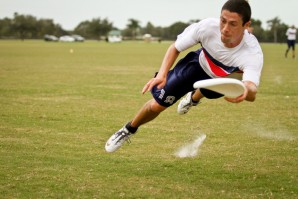
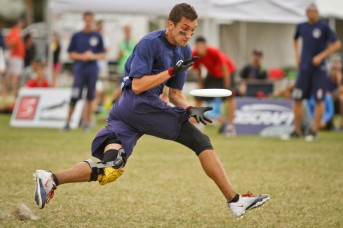
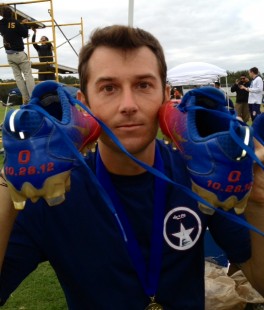
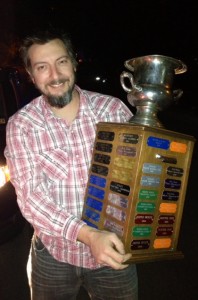





Comments Policy: At Skyd, we value all legitimate contributions to the discussion of ultimate. However, please ensure your input is respectful. Hateful, slanderous, or disrespectful comments will be deleted. For grammatical, factual, and typographic errors, instead of leaving a comment, please e-mail our editors directly at editors [at] skydmagazine.com.